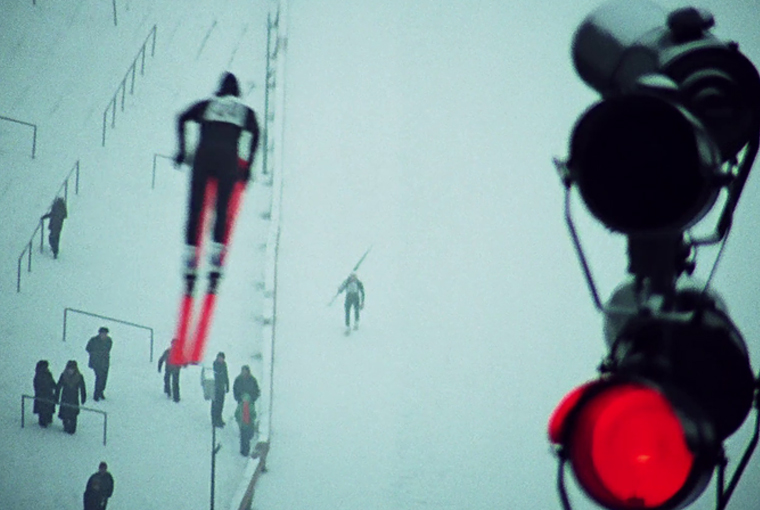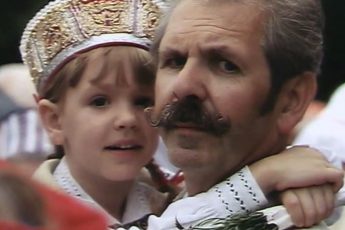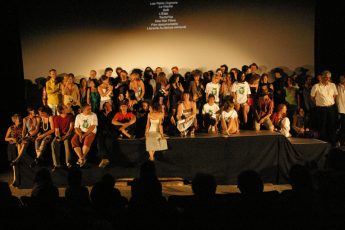The Ski Trilogy
Bogdan Dziworski’s Ski Scenes with Franz Klammer (1980), Classical Duel (1978), The Olympics (1978)
Vol. 21 (September 2012) by Colette de Castro
Bogdan Dziworski is a Polish documentary filmmaker who was particularly active during the seventies and eighties. His documentaries capture something of the essence of everyday life in the lives of perfomers. Arena of life (Arena życia, 1979), for example, is a twenty minute documentary about life in a circus. In some scenes, rather than showing the animals perform, the camera focuses only on the animal trainers themselves. All the glamour leaks out of the situation when we are presented with the bare focus of the trainers, puppeteers whose puppets become invisible. When the bear-trainer leans up to whisper into the ear of one of her bears, we hear no strange language, it is just soft, incoherent whisperings. When the viewer is presented with something other than the final performance, the magic of the moment disappears.
Still, most of Dziworski’s documentaries feature the antics of sportsmen. One of these films about a man with no hands (Kilka opowieści o człowieku, 1983) makes us marvel at his maneuverings, the precious contortions of his limited body. When the man with no hands dives into a pool from a highly-placed diving board, we see his body both from above and from under the water. His grace is astounding. But most of Dziworski’s sports films revolve around organized sports. Three of them concentrate on skiing, showing the sport as an inevitable pull towards gravity. The snow in these films isn’t pure white. The skiers don’t all have arrows pointing purposefully around their clothes. Nor do they smile with perfectly white teeth, their sunglasses glistening in the morning sun. These skiers are imperfect, and mostly because we see them up close. In The Olympics, kids fall so close to the camera that you can almost feel the chill from the ice shooting up to land on the lens of the camera. The comic aspect in the films is born out of a kind of respect towards the subjects being filmed. A respect that isn’t reflected by the subject’s distance but, rather, by the film’s objectivity towards them. One little boy refuses steadfastly to set off while his father pleads with him and places the ski poles in his son’s hands over and over again. There is certainly a lot of falling: Nordic Event (Dwuboz klasyczny, 1978) shows skiers coming down a particularly steep hill and falling again and again; every fall looking more painful than the last.
These three pieces form something of a trilogy. Two of them are about the reality of skiing, and one is about the myth. Which order to view them in thereby becomes the question. Ski Scenes with Franz Klammer is a surrealist documentary about Franz Klammer, its strange episodes forming a new picture of the skier. Olympic footage with commentary from the seventies is a stark contrast to this film. A voice-over raves about Klammer’s amazing skill and technique, Austrian fans wait at the bottom of the hill are cheering like crazy. In Austria, Klammer was known as the Kaiser during his heyday of downhill skiing. Here, we see no scenes of smooth descents. Instead, we are presented with a series of montages. Franz gets ready to see a show. He is undressed and then dressed up into an immaculate suit by his slinky, over-made up wife (Franz is like a puppet in the hands of a very sexy puppeteer). Next, Franz sits alone in a restaurant, the mirrored walls multiplying his image. The waiter drops his tray, and Franz eats spaghetti in slow motion and backwards.
The first time we meet Klammer he is cutting down a huge tree. Then he drives off, his yellow jeep with skis flying out the back of the truck in every direction. Klammer drives past picturesque mountains under a perfect sky. The car suddenly speeds into a tunnel, literally making a whooshing sound. These slightly science fiction-like sounds are a clue towards Dziworski’s attitude towards stardom: stardom tells stories that are too good to be true. The final scene of Ski Scenes feature Franz sitting in a wicker throne with three dogs, a cat, and many lamps around him on a red carpet. A kind of misplaced happiness pervades the surrealist atmosphere
This film goes great lengths to compare the life of a performer with that of a sportsman. In one dream-like scene, Klammer’s wife has taken him to the opera, and we see him bouncing higher and higher on a mini-trampoline set up in front of the stage. Suddenly, we see him sitting in an opera box with his wife, his performance being a memory of himself as a sportsman on stage. What is that link between the opera singer, and the sportsman? Dziworski illustrates that it is all in the fall. The French call this the «lâcher prise» (letting go). The fall, or the possibility of one, will only come when you let it come. Like the actor, the great skier has to master the art of total surrender to that possibility.




Leave a Comment